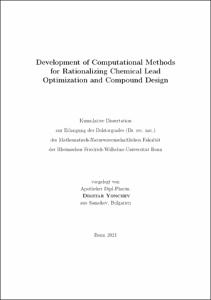Yonchev, Dimitar: Development of Computational Methods for Rationalizing Chemical Lead Optimization and Compound Design. - Bonn, 2021. - Dissertation, Rheinische Friedrich-Wilhelms-Universität Bonn.
Online-Ausgabe in bonndoc: https://nbn-resolving.org/urn:nbn:de:hbz:5-63835
Online-Ausgabe in bonndoc: https://nbn-resolving.org/urn:nbn:de:hbz:5-63835
@phdthesis{handle:20.500.11811/9310,
urn: https://nbn-resolving.org/urn:nbn:de:hbz:5-63835,
author = {{Dimitar Yonchev}},
title = {Development of Computational Methods for Rationalizing Chemical Lead Optimization and Compound Design},
school = {Rheinische Friedrich-Wilhelms-Universität Bonn},
year = 2021,
month = sep,
note = {Chemical lead optimization (LO) plays an important role in pharmaceutical drug discovery. It represents a highly complex multi-objective process, in which the ultimate goal is to identify a suitable candidate molecule that satisfies a variety of often contradicting properties. This is facilitated by iterative synthesis and testing of structurally similar analog compounds, leading to the formation of analog series (ASs) with distinct characteristics contingent upon the project requirements. Decision-making during LO is largely driven by the subjective intuition, experience, and knowledge of medicinal chemists, which renders it challenging and prone to bias when assessing the overall progress of a campaign. While most of the in silico methods relevant to LO are mainly focused on characterizing single molecules, so far only a few approaches have been explicitly designed to evaluate its course at the level of entire series. This thesis follows the gradual evolution of computational methodologies for data-driven LO rationalization based upon analyzing individual ASs. In addition, it explores different strategies for design and prioritization of new potential candidate compounds. Thereby, real-world LO campaigns are modeled by systematically extracting series from publicly available compound bioactivity data originating from medicinal chemistry literature and screening campaigns. The incremental development of novel cheminformatic approaches for quantifying the chemical saturation and structure-activity relationship progression of ASs culminates in the introduction of the Compound Optimization Monitor (COMO) as a diagnostic tool for holistic evaluation of different optimization aspects. Thus, by subjecting ASs to comprehensive scoring, their development stage can be estimated according to their distinct LO profile, providing a means for objective comparison and (de)prioritization as well as rationale for potential (dis)continuation criteria. Moreover, an elaborate system for virtual analog design and candidate selection is integrated into the method, in order to further enhance its potential for practical application and support medicinal chemists in deciding upon what compounds to synthesize next in a given series. Therefore, different de novo design strategies for generation of synthetically accessible focused compound libraries ranging from rule-based methods to generative deep learning models are investigated and combined with different approaches for compound activity prediction.},
url = {https://hdl.handle.net/20.500.11811/9310}
}
urn: https://nbn-resolving.org/urn:nbn:de:hbz:5-63835,
author = {{Dimitar Yonchev}},
title = {Development of Computational Methods for Rationalizing Chemical Lead Optimization and Compound Design},
school = {Rheinische Friedrich-Wilhelms-Universität Bonn},
year = 2021,
month = sep,
note = {Chemical lead optimization (LO) plays an important role in pharmaceutical drug discovery. It represents a highly complex multi-objective process, in which the ultimate goal is to identify a suitable candidate molecule that satisfies a variety of often contradicting properties. This is facilitated by iterative synthesis and testing of structurally similar analog compounds, leading to the formation of analog series (ASs) with distinct characteristics contingent upon the project requirements. Decision-making during LO is largely driven by the subjective intuition, experience, and knowledge of medicinal chemists, which renders it challenging and prone to bias when assessing the overall progress of a campaign. While most of the in silico methods relevant to LO are mainly focused on characterizing single molecules, so far only a few approaches have been explicitly designed to evaluate its course at the level of entire series. This thesis follows the gradual evolution of computational methodologies for data-driven LO rationalization based upon analyzing individual ASs. In addition, it explores different strategies for design and prioritization of new potential candidate compounds. Thereby, real-world LO campaigns are modeled by systematically extracting series from publicly available compound bioactivity data originating from medicinal chemistry literature and screening campaigns. The incremental development of novel cheminformatic approaches for quantifying the chemical saturation and structure-activity relationship progression of ASs culminates in the introduction of the Compound Optimization Monitor (COMO) as a diagnostic tool for holistic evaluation of different optimization aspects. Thus, by subjecting ASs to comprehensive scoring, their development stage can be estimated according to their distinct LO profile, providing a means for objective comparison and (de)prioritization as well as rationale for potential (dis)continuation criteria. Moreover, an elaborate system for virtual analog design and candidate selection is integrated into the method, in order to further enhance its potential for practical application and support medicinal chemists in deciding upon what compounds to synthesize next in a given series. Therefore, different de novo design strategies for generation of synthetically accessible focused compound libraries ranging from rule-based methods to generative deep learning models are investigated and combined with different approaches for compound activity prediction.},
url = {https://hdl.handle.net/20.500.11811/9310}
}






